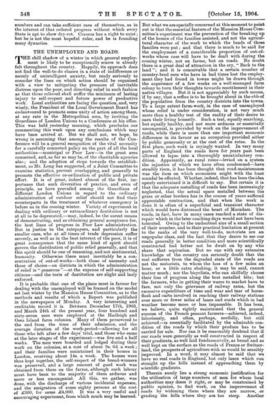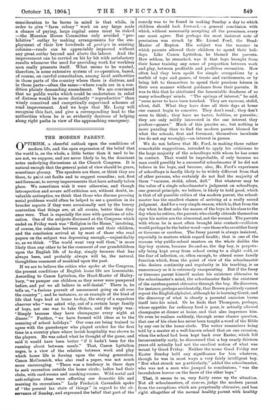T HE chill shadow of a winter in which general employ-
ment is likely to be exceptionally scarce is already felt throughout the country. Happily, its approach does not find the well-to-do classes in a state of indifference or merely of unintelligent anxiety, but ready seriously to consider the lines on which action should be organised with a view to mitigating the pressure of inevitable distress upon the poor, and directing relief in such fashion as that those relieved shall suffer the minimum of lasting injury to self-respect and future power of productive work. Local authorities are facing the question, and, very wisely, the President of the Local Government Board has endeavoured to promote some unity of action among them, at any rate in the Metropolitan area, by inviting the Guardians of London Unions to a Conference at his office. This was held yesterday morning, which precludes our commenting this week upon any conclusions which may have been arrived at. But we shall not, we hope, be wrong in assuming that among the results of the Con- ference will be a general recognition of the vital necessity for a carefully concerted policy on the part of all the local authorities—municipal or Poor Law—in the great area concerned, and, as far as may be, of the charitable agencies also ; and the adoption of steps towards the establish- ment, as Mr. Long has suggested, of a Joint Committee to examine statistics, prevent overlapping, and generally to promote the effective co-ordination of public and private effort. It is of great, indeed almost of the first, im- portance that such diversities of practice, and even of principle, as have prevailed among the Guardians of different London Unions in regard to the ordinary administration of outdoor relief should not find their counterparts in the treatment of whatever emergency is before us in the coming winter. Variety of experiment in dealing with ordinary or extraordinary destitution is not at all to be deprecated,—may, indeed, be the surest means of demonstrating, and so obtaining general acceptance for, the best lines of progress in Poor Law administration. But in justice to the ratepayers, and particularly the smaller ones, who at all times of trade depression suffer severely, as well as in the best interest of the poor, it is of great consequence that the same kind of spirit should govern the distribution of public relief generally, and that this spirit should be one of reasoning, and not sentimental, humanity. Otherwise there must inevitably be a con- centration of out-of-works—both those of necessity and those of choice—on districts in which the administration of relief is "generous "—at the expense of self-supporting citizens—and the tests of destitution are slight and laxly enforced.
- It is probable that one of the plans most in favour for dealing with the unemployed will be framed on the model set last winter by the Mansion House Committee, as to the methods and results of which a Report was published in the newspapers of Monday. A very interesting and creditable record it is. Between December 17th, 1903, and March 24th of the present year, four hundred and sixty-seven men were employed at the Hadleigh and Osea Island farm colonies. Many of them persevered to the end from the time of their admission, and the average duration of the work-period—allowing for all those who left after a few days' trial, and those who came at the later stages of the experiment—was five and a half weeks. The men were boarded and lodged during their work on the colonies, at a cost of about 9s. 6d. a week ; and their families were maintained in their homes in London, receiving about 14s. a week. The homes were thus kept together, the self-respect of the bread-winners was preserved, and a large amount of good work was obtained from them on the farms, although such labour must have been to the majority ofthem arduous and more or less uncongenial. All this, we gather, was done, with the discharge of various incidental expenses, and the emigration of some eighty persons at the cost of £360, for some £4,000. It was a very useful and encouraging experiment, from which much may be learned. mittee's experiment was the prevention of the breaking up of the homes of the families assisted, and not the agricul- tural character of the work to which the heads of those families were put ; and that there is much to be said for the employment of a considerable proportion of out-of- works whose case will have to be dealt with during the coming winter, not on farms, but on roads. No doubt there is a great deal of attraction in the cry, "Back to the land "; and it is conceivable that a certain number of country-bred men who have in bad times lost the employ- ment they had found in towns might be drawn through the experience of a few weeks on a well-managed farm colony to turn their thoughts towards resettlement in their native villages. But it is not appreciably by such means, if by any, that a reflux is to be brought about in the ebb of the population from the country districts into the towns. To a large extent farm-work, in the case of unemployed whose relief is under consideration, is not very much more than a healthy test of the reality of their desire to earn their living honestly. Such a test, equally searching, but equally healthy, and not more arduous or essentially uncongenial, is provided by work on the improvement of roads, while there is more than one important economic difference in its favour as an occupation provided either by public generosity or at the cost of the rates. In the first place, such work is cryingly wanted. In very many parts of England the roads have for years past been allowed to lapse into a thoroughly unsatisfactory con- dition. Apparently, as rural rates—levied on a system the injustice of which we have often condemned—have steadily risen, it has been thought that road-maintenance was the item on which economies might with the least scandal be effected. Whether, indeed, that has been the idea openly entertained it is difficult to say. But certain it is that the adequate metalling of roads has been increasingly neglected, that the actual space metalled between the grass or other borders has in the course of years suffered appreciable contraction, and that when the work is done it is often of a superficial and transient character which would have distressed the heart of Macadam. The roads, in. fact, have in many cases reached a state of dis- repair which in the later coaching days would not have been tolerated. Owing to the undoubted sins of a small section of their number, and to their practical limitation at present to the ranks of the very well-to-do, motorists are an unpopular class, and the fact that they desire to see our roads generally in better condition and more scientifically constructed had better not be dwelt on by any who share that aspiration. But no one with any extensive knowledge of the country can seriously doubt that the real sufferers from the degraded state of the roads are not the motorists, to whom the loss of a few miles an hour, or a little extra shaking, it may be said, cannot matter much ; nor the bicyclists, who can skilfully choose their line of progress along the best metalled bits ; but the farmers, who in getting their wares to market have to face, not only the grievance of railway rates, but the excessive expenditure of time and wear and tear of horse- flesh and carts involved in reaching their railway stations over more or fewer miles of lanes and roads which in bad weather become more or less impassable. It has been, we believe, quite rightly maintained that the general success of the French peasant farmers—achieved, indeed, laboriously, and often, perhaps, sordidly, but still achieved—is essentially facilitated by the admirable con- dition of the roads by which their produce has to be carried for sale. Nor can it be reasonably doubted that if our roads were generally as well constructed in respect of their gradients, as well laid fundamentally, as broad and as well kept on the surface as the roads of France or Switzer- land, the prospects of agriculture with us would be sensibly improved. In a, word, it may almost be said that we have no real roads in England, but only lanes which run straight up the hills instead of approaching them by scientific gradients.
Therein surely lies a strong economic justification for the utilisation of large numbers of men for whom local authorities may deem it right, or may be constrained by public opinion, to find work, on the improvement of roads by widening them where they are narrow, or grading the hills where they are too steep. Another consideration to be borne in mind is that while, in order to give "farm colony" work on any large scale a chance of paying, large capital sums must be risked —the Mansion House Committee only avoided " pro- hibitive " outlay by making arrangements for the em- ployment of their few hundreds of protégés in existing colonies—roads can be appreciably improved without any great outlay beyond and above the labour. And the improvement can be carried on bit by bit with satisfactory results whenever the need for providing work for workless men really presents itself. What seems to be wanted, therefore, is some extensive system of co-operation, based, of course, on careful consultation, among local authorities in those parts of the country where there is distress, and in those parts—often the same—where roads are in a con- dition plainly demanding amendment. We are convinced that no public works which could be undertaken in relief of distress would be more distinctly " reproductive " than wisely conceived and energetically supervised schemes of road improvement. And we hope that Mr. Long will recognise this fact, and give a corresponding lead to the authorities whom he is so evidently desirous of helping along right paths in view of the approaching emergency.











































 Previous page
Previous page